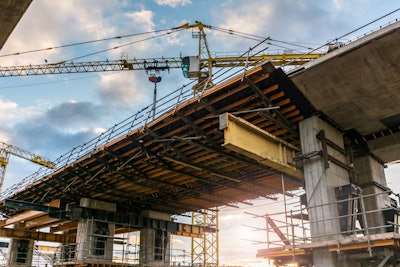
Editor's Note: This story has been updated May 12, 2022, with new information about the Buy America rule.
Groups that support construction contractors have all been in favor of the historic $1 trillion infrastructure law initiated by President Joe Biden that eventually passed Congress in bipartisan votes.
But that support has turned to frustration as the Biden administration institutes a series of rules that the groups say will undermine the goal of the program to upgrade beleaguered U.S. roads, bridges, utilities and other infrastructure.
Since Biden’s signature November 15 to enact the law, his administration has:
- Mandated labor agreements for large federal construction projects.
- Required steel, iron and construction materials used in infrastructure projects be made in the U.S.
- Reinstated rules that could lead to lengthy environmental reviews on projects.
The measures will cause delays for much-needed infrastructure improvements, as well as drive up costs and discourage contractors from bidding, the groups say.
Biden and supporters argue the rules will help workers, boost American manufacturing and protect the environment.
Here’s a rundown of the issues and where things stand:
Stricter environmental rules restored
THE RULE: On April 19, the White Council on Environmental Quality (CEQ) announced it was restoring parts of the National Environmental Policy Act (NEPA) that the Trump administration had revoked. The changes made in 2020 were partly designed to speed up the regulatory process for infrastructure projects and clear up confusion concerning the rules’ enforcement. The restored NEPA regulations require federal agencies to evaluate all environmental impacts of a project – direct, indirect and cumulative – including “fully evaluating climate change impacts and assessing the consequences of releasing additional pollution in communities that are already overburdened by polluted air or dirty water.”
FOR: “Restoring these basic community safeguards will provide regulatory certainty, reduce conflict and help ensure that projects get built right the first time,” said CEQ Chair Brenda Mallory. “Patching these holes in the environmental review process will help projects get built faster, be more resilient and provide greater benefits to people who live nearby.”
AGAINST: NEPA environmental reviews can take as long as seven years, while the bipartisan infrastructure law sets a goal of completing reviews within two years, according to the American Road & Transportation Builders Association. The group adds that implementing NEPA in the past has proved confusing and led to numerous, lengthy court battles over projects.
“Reinstating outdated regulations that require project sponsors to guess about the indirect impacts of transportation improvements only guarantees that those projects will take too long to deliver,” says ARTBA CEO David Bauer.
WHAT'S NEXT?: The newly restored rules are set to take effect May 20. The White House council is also working on a second phase of NEPA rulemaking. ARTBA says it will continue to fight changes to the NEPA rules in federal court.
Made in America is the law
THE RULE: On April 18, a memorandum was issued to federal agency heads that by May 14 federal funding for infrastructure cannot be spent on a project “unless all of the iron, steel, manufactured products, and construction materials used in the project are produced in the United States.” The memorandum is the Biden administration’s enforcement guidance for the Build America, Buy America Act that was included with the new infrastructure law passed by Congress. The memorandum also allows waivers of such requirements by federal agencies when necessary. Waiver reasons are if there is not enough domestic supply of the materials available, if U.S. materials will increase the overall cost of the project by more than 25%, or if the materials requirement is inconsistent with the public interest. “Construction materials” listed in the memorandum are non-ferrous metals, plastic and polymer-based products (including polyvinylchloride, composite building materials, and polymers used in fiber optic cables), glass, lumber and drywall.
FOR: Biden touts the rule as a way to create more jobs and eventually ease the supply shortages through less dependence on imports and also lower prices through domestic production.
“As some federal programs do not apply Buy America requirements for the procurement of iron and steel products, we are pleased that today’s initiative begins the process to remedy this situation by providing clear guidance to federal agencies for adopting appropriate Buy America requirements for all federally funded infrastructure projects,” says Kevin Dempsey, president and CEO of the American Iron and Steel Institute. “This announcement is an important first step toward ensuring the fullest possible implementation and enforcement of Buy America domestic procurement preferences by all federal agencies.”
AGAINST: Stephen Sandherr, CEO of the Associated General Contractors of America, says the rule will increase red tape and make it more difficult to obtain construction supplies at a time of historic shortages and price increases.
“Whatever minimal gains in domestic construction material production this new mandate might temporarily generate will be offset by the increased cost of constructing new projects, slower schedules to build those projects and the fact some key projects could be hamstrung from moving forward,” Sandherr says. “Americans were right to be excited about the potential for the Bipartisan Infrastructure Law to make our economy more efficient, our commutes faster, our water safer and our economy stronger. But this new mandate will leave too many taxpayers wondering where the trillion dollars went while they are still stuck in traffic, still hearing about boil water orders and still wondering why we can’t have better transit systems.”
WHAT'S NEXT?: The rule was set to take effect May 14. But the U.S. Department of Transportation has proposed a 180-day waiver for federal agencies to develop enforcement and compliance guidance, according to AGC. The Made in America Office says it will ensure any waivers of the Made in America laws “are applied clearly, consistently and transparently across federal agencies.” Waivers are listed on MIAO’s website.
Labor agreements required
THE RULE: On February 4, Biden signed an executive order that requires project labor agreements (PLAs) on $35 million-plus federal-contract construction projects as a way to improve timeliness, lower costs and increase quality, he says. The agreements set up collective bargaining between unions and contractors for such things as wages, benefits and how to resolve labor disputes. Biden’s executive order could affect $262 billion in federal government construction contracting and nearly 200,000 workers.
FOR: Biden says PLAs will make it easier to manage multi-million-dollar projects, including coordinating multiple contractors and subcontractors and their employees and preventing disputes between subcontractors. They will raise quality standards by weeding out contractors that pay low wages and have not properly trained their workers. To be eligible for the project, such contractors would have to raise their standards. The agreements create more certainty for workers as to what they will be paid and their benefits, he says.
“PLAs support well-paying job creation, increase apprenticeship and improve local hiring goals to transition more workers into construction careers,” says Sean McGarvey, president of North America’s Building and Trades Union. “Moreover, pre-apprenticeship requirements in PLAs help avail thousands of women, people of color and veterans access to construction career pathways.”
AGAINST: Associated Builders and Contractors has been fighting the rule since it was signed, saying among other things that it is unfair to non-union workers. ABC recently sent a letter to the White House with 1,200 signatures from its member companies and chapters asking for it to be repealed.
“Recent government-mandated PLAs on federal and federally assisted projects have resulted in litigation, reduced competition, increased costs, needless delays and poor local hiring outcomes,” said the letter.
ABC also noted that 16 Republican governors have written Biden calling for him to scrap his executive order.
“When mandated by government agencies, PLAs can interfere with existing union collective bargaining agreements and needlessly discourage competition from quality nonunion contractors and their employees who comprise 87.4% of the private U.S. construction industry workforce …,” the governors’ April 26 letter says. “Reducing competition from some of the best union and nonunion construction firms and workers will exacerbate the construction industry’s skilled labor shortage, delay projects, and increase construction costs by estimates of 12% to 20% per project, which will result in fewer infrastructure improvements, less construction industry job creation, and higher taxes.”
WHAT'S NEXT?: Biden’s executive order took effect February 4. So far, efforts to persuade him to rescind it have not changed that.











